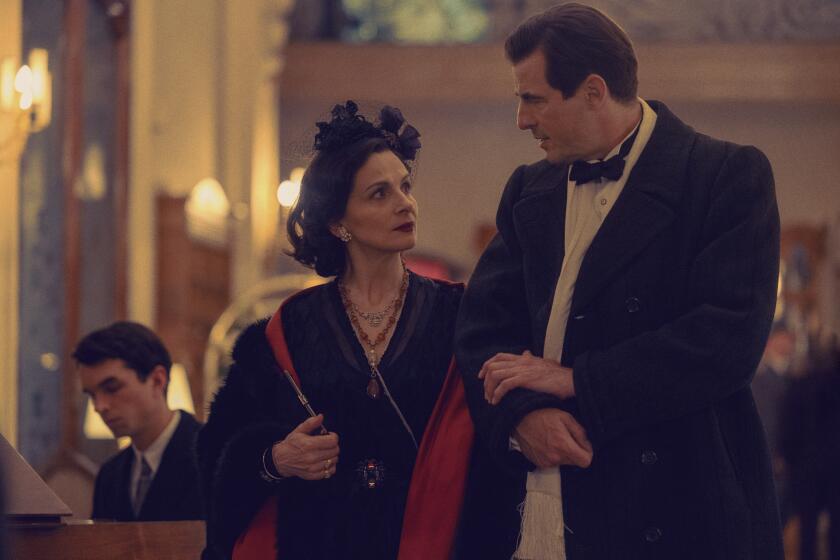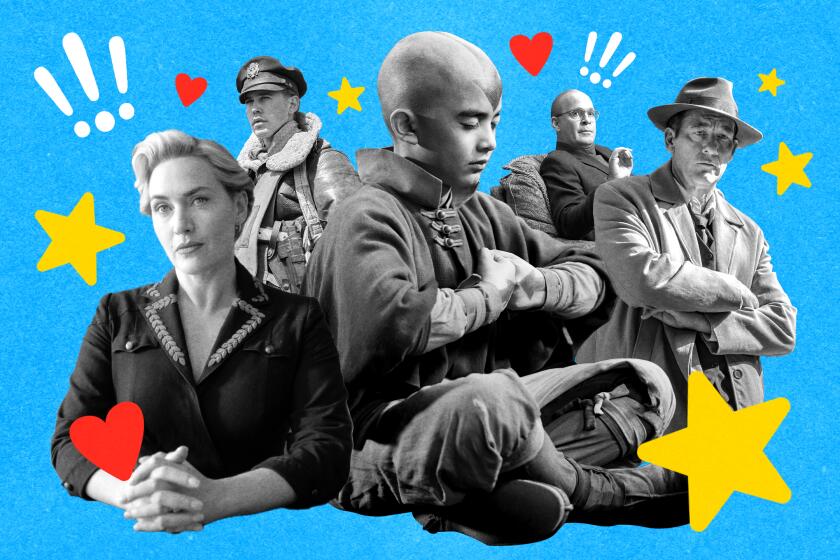‘The New Look’ chronicles and contrasts the lives of Christian Dior and Coco Chanel
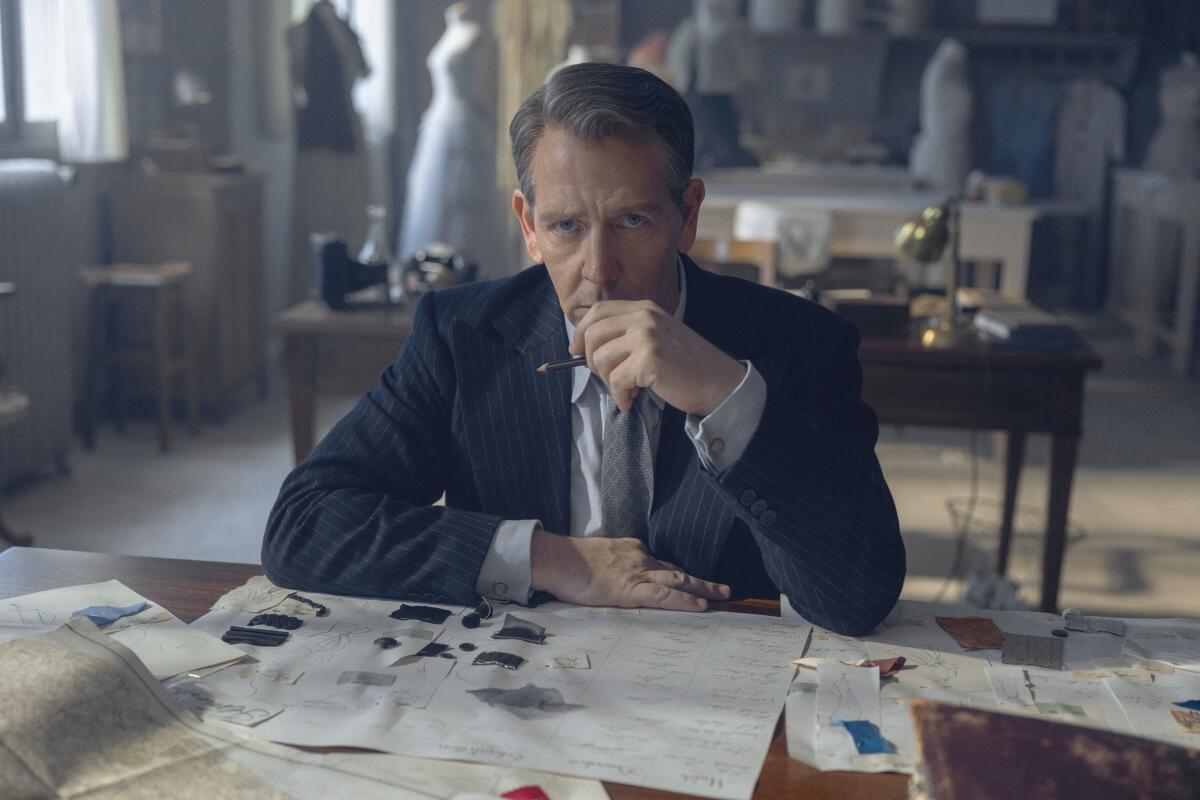
- Share via
“The New Look,” a 10-episode miniseries — or possibly a series — premiering Wednesday on Apple TV+, is set in the world of Paris couture over four years, 1943 to 1947, from near the end of World II to not long after, when designer Christian Dior presented his first collection and became an overnight sensation at age 41. It’s billed as “inspired by” true facts — which is to say, the fabric has been much embroidered.
Although the title refers to the sobriquet bestowed upon that collection by Harper’s Bazaar editor in chief Carmel Snow (Glenn Close), it might more accurately be called something like “Christian and Coco,” since the running time has been split pretty evenly between Dior and rival designer Coco Chanel — or perhaps yet more accurately, “Christian or Coco,” since it consists of two interwoven but completely separate films.
Though they work in the same field in the same place, though not always at the same time — Chanel closed her studio in 1939 and didn’t mount another collection until 1954 — the characters have nothing to do with, and only a little to say about, each other. Indeed, apart from one brief apocryphal encounter and a glance across a room crowded with Nazis, they never share a scene.
“The New Look,” debuting Wednesday on Apple TV+, examines Christian Dior’s connection to the French Resistance and Coco Chanel’s role as a Nazi agent in World War II.
One could argue that there’s structural sense in this two-mints-in-one approach. The life and career of Dior (Ben Mendelsohn) are not obviously the stuff of exciting docudrama, as a major streaming platform would define it, and Chanel (Juliette Binoche), certainly in the years pictured here, is not a particularly sympathetic figure. There’s a compare-and-contrast element to their individual stories, underscored by frequent cross-cutting, though one would be hard put to pull any great meaning from the juxtapositions.
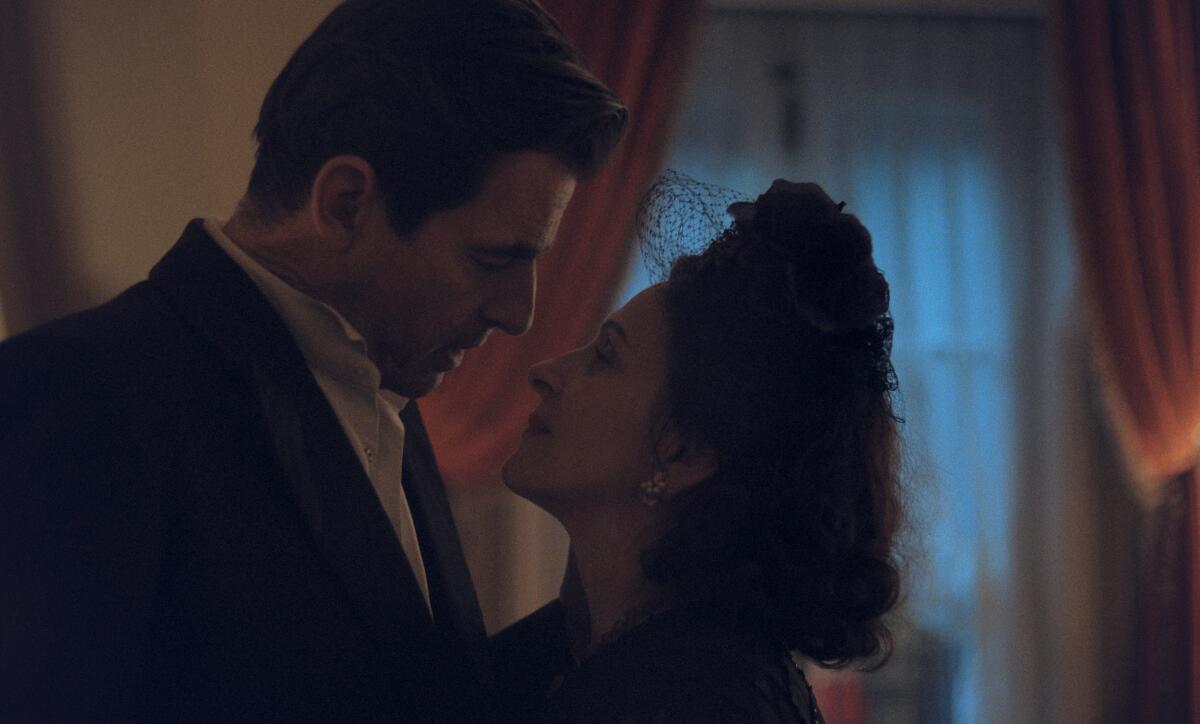
We begin in 1955. A self-effacing Dior is at the Sorbonne, before a packed house, presenting a greatest-hits retrospective of his work, described by the moderator as having “started a revolution [and] helped humanity find beauty and the desire to live again after the horrors of World War II.” (“Ooh, is that what they’re teaching you?” he quips.)
Meanwhile, somewhere across town, Chanel, who at 70 is making a comeback, dismisses him to a clutch of reporters: “I feel sorry for the students at the Sorbonne having to suffer through him today. ... Christian Dior ruined French couture, and I’m coming back to save it.”
From there, we flip back to 1943 — not to the atelier of Lucien Lelong (John Malkovich, whose French accent seems performed under duress), where Dior, still a “nobody,” is employed as a designer, but to the streets of Paris where Christian is standing in line for food and sister Catherine (Maisie Williams), a member of the French Resistance, is setting a trap for some German soldiers.
When not sketching designs or contemplating a drape, or worrying about his sister, Dior hangs out with designers Cristóbal Balenciaga (Nuno Lopes), already famous, and Pierre Balmain (Thomas Poitevin), later famous, who criticize him because he’s designing a gown ball for a party being thrown for a Nazi bigwig, to which he responds that Lelong hasn’t told him who the client is, and anyway he needs to support his sister and father. (Lelong is given short shrift here, but many credit him with keeping the industry alive through the war.) An antic Pierre Cardin (Eliott Margueron), who would work on Dior’s first collection, also makes an appearance. There is a disappointing lack of shop talk.
Chanel, meanwhile, is living at the Hotel Ritz, where the local Nazi brass have set themselves up. Repaying a favor, she has dinner with tall, dark and handsome-if-you-like-that-type Gestapo spy Hans Günther von Dincklage (Claes Bang), called “Spatz,” with whom she commences an affair. This leads to a dinner party for Heinrich Himmler (“What is this ‘haute couture’?” asks the SS boss and Holocaust architect), where she is lively and amusing and politically noncommittal. She’s later drafted as agent in something called Operation Modelhut — relatively benign as such missions go, it had to do with getting a message to Churchill. (The implication is always that she’s a less than eager participant.)
We gathered together the TV experts at The Times to preview our most anticipated new and returning TV shows of 2024. Here are 14 to keep an eye out for.
What concerns her more is the fact that Pierre and Paul Wertheimer, who financed the production of her perfume Chanel No. 5 and controlled 70% of the stock in comparison to Chanel’s 10%, have moved to the United States and, as Jews, have temporarily transferred the business to a Christian friend, in order to avoid German expropriation. She wants her money.
After the war, they meet again, with matters unresolved — Chanel hopes to rewrite what she considers a bad deal — and in a strange exchange, Pierre will ask her to apologize first for having tried to take the business herself, using the so-called Aryan laws.
Pierre: “We were being hunted, exterminated.” Coco: “Have you ever thought about what a woman has to face to survive in this world? I was cornered just like you. The difference is I was used to it.”
I am entirely unsure how we’re meant to read that response, as a feminist statement — and there was an element of literal liberation in Chanel’s post-Edwardian, uncorseted designs — or an expression of cluelessness, or I don’t know what. But if ever an equivalence were false, that is it.
Where Dior is immediately likable, in his low-key way, creator Todd A. Kessler (“Damages,” “Bloodlines”), who also directed some episodes, does his strenuous best to make Chanel at least understandable, even relatable, despite her anger, selfishness, bad decision making, Nazi affiliations and briefly suggested antisemitism. As represented here, her only deep human affections are for her nephew, André Palasse (Joseph Olivennes), who serves in the French army, and his daughter; in gaining André’s release from the Germans, she makes a bargain that will come back to haunt her.
She has an up-and-down relationship, ricocheting between affection and annoyance, with old friend Elsa Lombardi (Emily Mortimer, typically excellent), who shares a last name and a handful of biographical details with Chanel’s real-life friend and fashion inspiration Vera Bate Lombardi.
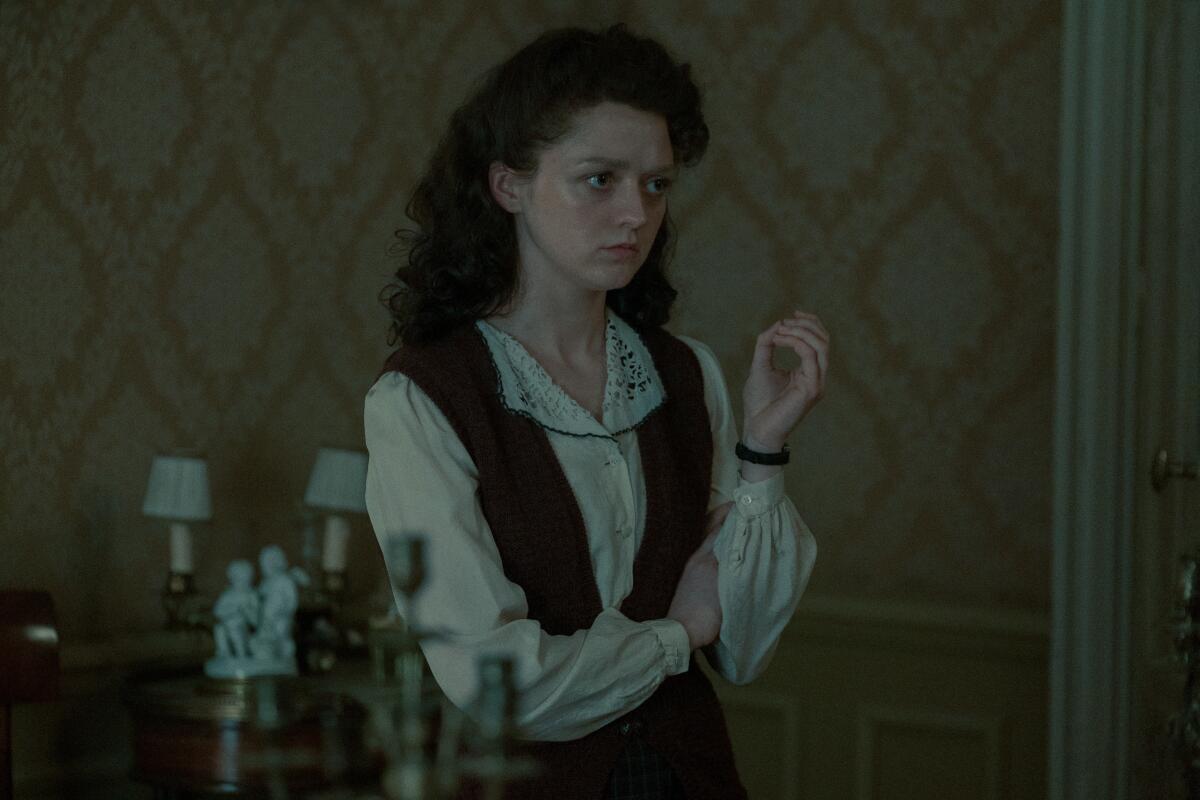
The length of the series necessitates regular injections of adrenaline, and while there are some legitimately dramatic episodes, especially as concerns Catherine, who was captured by the Nazis and sent to a work camp, even the simplest decisions can precipitate a crisis. (Mortimer’s Elsa, a frequently inebriated hot mess — the name change frees Kessler to do what he likes with the character — seems crafted specifically for that purpose.)
As the series carries on toward a climax, or climaxes, old Hollywood tropes rush in, things get corny, and the whole show becomes less persuasive. Given that the emphasis is on the personal drama and melodrama, one exits the series without having learned much about dressmaking — which, like any craft or industry, can be compelling in its own right — or, indeed, with any idea of what made the New Look new, or exactly what Chanel, whose career in fashion went back to 1909, disliked about Dior, or how their approaches to fashion differed.
Still, if taken as a whole the series has a lumbering, scattered quality there are things to enjoy along the way. The Paris locations are real or as good as (none of your “Prague will do” here); individual scenes are well-written; the re-creation of the creation of the Théâtre de la Mode, a 1945 exhibition that featured miniature mannequins wearing bespoke fashions by 15 top designers, as if to say, “We’re still here,” is not a little moving; and the two stars are very fine in their contrasting modes.
That Chanel is given to dramatics, and quick alterations of attitude, gives Binoche a lot to work with, while Mendelsohn, representing a character shy and interior, given to sighs and staring into the middle distance as he dithers over a family matter or the line of a skirt or a tarot card reading, is impressive in his quietude; he comes across as a real person, whether or not it’s the real person he’s playing.
More to Read
The complete guide to home viewing
Get Screen Gab for everything about the TV shows and streaming movies everyone’s talking about.
You may occasionally receive promotional content from the Los Angeles Times.
